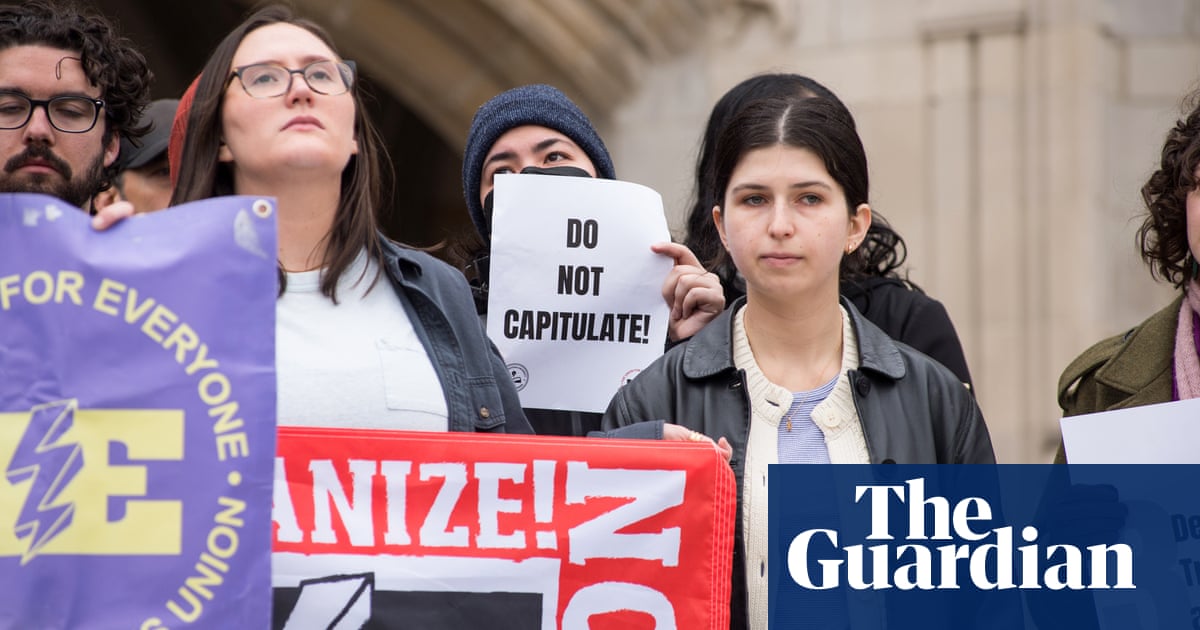More than 100 presidents of US colleges and universities have signed a statement denouncing the Trump administration’s “unprecedented government overreach and political interference” with higher education – the strongest sign yet that US educational institutions are forming a unified front against the government’s extraordinary attack on their independence.
Thestatement, published early on Tuesday by the American Association of Colleges and Universities, comes weeks into the administration’s mounting campaign against higher education, and hours after Harvard University became thefirst school to suethe government over threats to its funding. Harvard is one of several institutions hit in recent weeks with huge funding cuts and demands they relinquish significant institutional autonomy.
The signatories come from large state schools, small liberal arts colleges and Ivy League institutions, including the presidents of Harvard,Princeton and Brown.
In the statement, the university presidents, as well as the leaders of several scholarly societies say they speak with “one voice” and call for “constructive engagement” with the administration.
“We are open to constructive reform and do not oppose legitimate government oversight,” they write. “However, we must oppose undue government intrusion in the lives of those who learn, live, and work on our campuses.”
Harvard’s lawsuit comes after the administration announced it would freeze $2.3bn in federal funds, andDonald Trumpthreatened to revoke its tax-exempt status, over claims the university failed to protect Jewish students from pro-Palestinian protests. The suit and the statement, taken together, mark an increasingly muscular response from universities following what initially appeared to be a tepid approach.
While some university leaders have in recent weeks criticised the administration and indicated they will not abide by its demands, the statement marks the first time presidents have spoken out collectively on the matter. The joint condemnation followed a convening of more than 100 university leaders called by the AAC&U and the American Academy of Arts and Sciences last week to “come together to speak out at this moment of enormity”, said Lynn Pasquarella, the president of the AAC&U.
Pasquarella said that there was “widespread agreement” across a variety of academic institutions about the need to take a collective stand.
“Much has been written about this flood-the-zone strategy that’s being used in the current attacks on higher education, and it’s a strategy designed to overwhelm campus leaders with a constant barrage of directives, executive orders, and policy announcements that make it impossible to respond to everything all at once,” she said, explaining why it has taken until now for a joint response. “Campus leaders have had a lot to deal with over the past few months, and I think that’s part of the reason, but it’s also the case that they are constrained by boards, by multiple constituencies who are often asking them to do things that are at odds with one another.”
The Trump administration has issued a barrage of measures aimed at universities the right has described as “the enemy” – some under the guise of fighting alleged antisemitism on campuses and others in an explicit effort to eradicate diversity and inclusion initiatives. Billions in federal funds are under threat unless universities comply with extreme demands, such as removing academic departments from faculty control, “auditing” the viewpoints of students and faculty, and collaborating with federal authorities as they target international students for detention and deportation. Along with its actions against Harvard,it has threatened and in some cases withheld millions more from Cornell, Northwestern, Brown, Columbia, Princeton and the University of Pennsylvania.
Columbia haslargely acceptedthe administration’s requirements to restore funding,including placing anacademic departmentunder outside oversight. Its president did not sign the collective statement.
The measures against the schools, which are already upending academic research, undermine longstanding partnerships between the federal government and universities, and are contributing to an atmosphere of repression, the statement’s signatories note.
Sign up toThis Week in Trumpland
A deep dive into the policies, controversies and oddities surrounding the Trump administration
after newsletter promotion
“Our colleges and universities share a commitment to serve as centers of open inquiry where, in their pursuit of truth, faculty, students, and staff are free to exchange ideas and opinions across a full range of viewpoints without fear of retribution, censorship, or deportation,” they write.
Last week, Harvard University issuedthe strongest rebuke yetof the administration’s demands, with president Alan Garbersetting off a showdownwith the White House by saying that the university would not “surrender its independence or relinquish its constitutional rights”.
While Harvard’s lawsuit was the first by a university,higher education associations and organisations representing faculty have filed otherlegalchallengesover the cuts.
Faculty at some universities are alsoorganising to protect one another, withseveral membersof the Big Ten Academic Alliance, a consortium of some of the country’s largest state universities, signing on to a resolution to establish a “mutual defence compact”.
At a second convening by the AAC&U on Monday some 120 university leaders also discussed what steps they may take next, including efforts to engage their broader communities and the business world to defend academic freedom.
The joint statement, Pasquarella added, was just the beginning, and intended “to signal to the public and to affirm to ourselves what’s at stake here, what’s at risk if this continual infringement on the academy is allowed to continue”.
